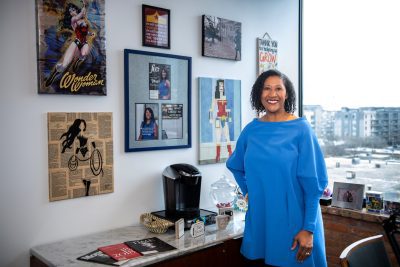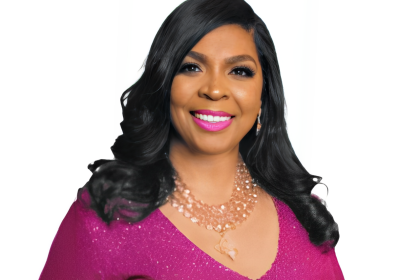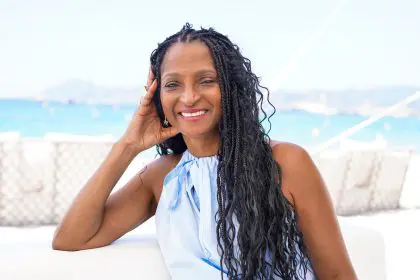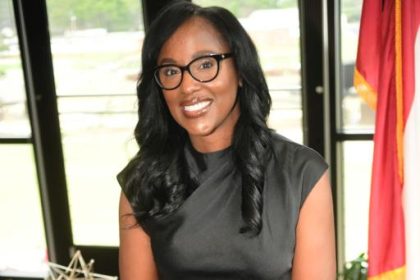Rahquel Purcell is a 30-year Supply Chain executive with a proven track record of game-changing results anchored in customer-centric innovation. Since October 2022, she has served as Chief Transformation Officer, North America for L’Oréal USA, which leads the number one beauty market in the world with a portfolio of over 30 beauty brands. Rahquel joined L’Oréal in 2016, and held the role of Head of Supply Chain, before being appointed Chief Operations Officer for North America in 2020. She spent 23 years at Procter & Gamble, with a career spanning the supply chain, manufacturing, purchasing, and packaging functions.
Rahquel is a people-first leader guided by head and heart, inspiring teams to deliver breakthrough results for the company, the community and the planet. Recognized as an inspirational leader motivating people to perform at high levels, Rahquel is a true visionary with an impressive career, including international work experience in Western Europe, the Middle East, and Africa. She has led large, global teams across the Luxury Beauty, Consumer Products, Food & Beverage, and Automotive industries, always with an eye for transformation and disruptive innovation.
Rahquel is a graduate of the University of Michigan, and she holds honorary degrees from MIT, Harvard and the CEDEP Business School in Paris. She also serves as an Independent Director on the Public Board of MSC Industrial Supply Co. In addition to her professional achievements, she is a proud wife, mother of two, and a caregiver. In the midst of juggling all that, she found time to speak to rolling out publisher and CEO Munson Steed.
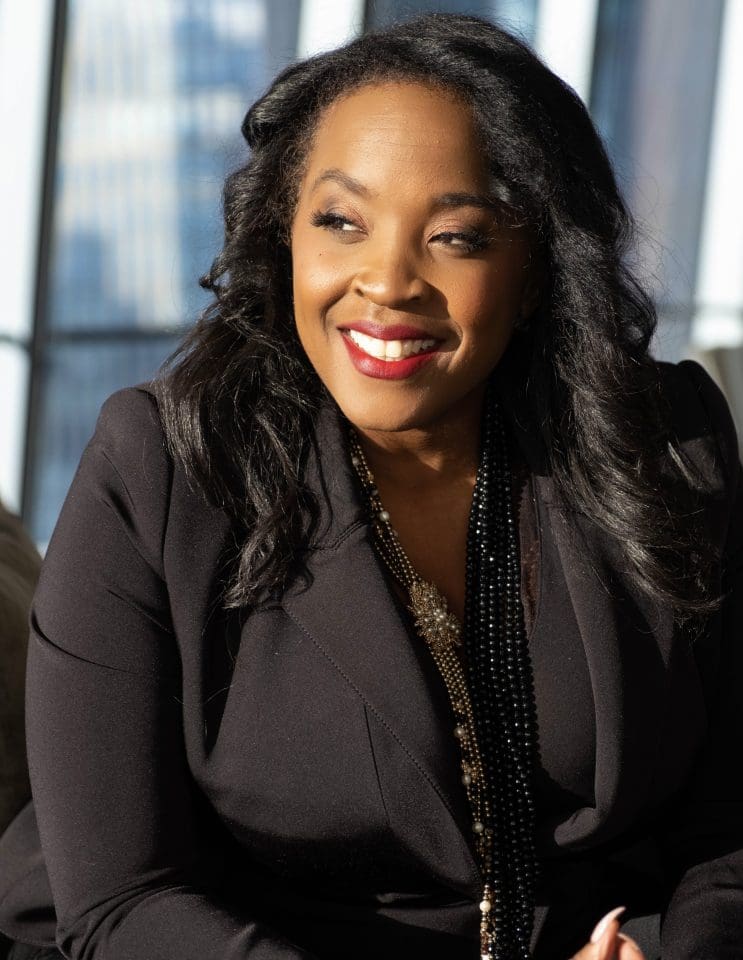
Munson Steed: Hey everybody, this is Munson Steed and we are on rolling out, and I am joined by a phenomenal leader. We’re gonna call this A Seat at the Table. This is where you find out what it is and obviously, she’s a Sister with Superpowers. I love all of the powers that she has. She’s going to share with us, my dear sister, huge superpowers. Rahquel Purcell, how are you today?
Rahquel Purcell: Thank you, thank you, I’m really excited to be here and have this opportunity to talk with you and to your audience. Thank you for having me.
MS: Oh, thank you, thank you, not many and you’re welcome, welcome, get to have cool titles, most people with very cool titles, have to do uncool and have poor views and are in offices that are close to closets and don’t get to come through which you are surely coming through. So we really are proud of what you do. But what is a transformation officer?
RP: So I’m going to do my best [because] it’s a very big title. So, I’m the Chief Transformation Officer for L’Oreal for North America and I’ve been in the role for just over a year. And so, I’ll talk about this particular role and then maybe pivot a bit to share my background and how I got into this opportunity. So, it’s a brand new function in L’Oreal, we like to use French words and French acronyms. So, it’s a new metier and what my team and I, we are driving a portfolio of digital and tech, and overall capability innovations that aggregate to 10 figures in value creation.
So really setting the stage for the next generation of innovations that allow us to continue winning and to continue as the No. 1 beauty company in the world. You don’t get here by accident, and we have no intentions of changing that anytime soon. So, in order to do that, though, you need to be ahead of the trends. And what we like to say is that we move at the speed of culture. So that’s my current job. But, Munson, I’m an operator by trade. So, I’ve been in corporate America for 32 years. I spent 23 years at Procter and Gamble, and then heading into my ninth year at L’Oreal.
And in my previous assignment, I was the COO so I was the Chief Operations Officer and really drove a supply chain transformation during COVID, which was some of the worst supply chain conditions I certainly have ever experienced in the history of my career. And in the midst of all of that, we had phenomenal growth. We grew two times the market. And really, it’s because we had anticipated where the puck was going and so when COVID showed up, we already had some very important building blocks in place that we could accelerate and make choices in real time to either press the brake in some cases but also to really move with speed and agility and have, we’re actually on the best three-year history of L’Oreal USA from a performance perspective.
MS: That’s beautiful. Thanks for sharing, I really heard a phenomenal description that kept my attention on what it was in this job and you just threw in the billions and 2x me real quick but…
RP: Metrics matter.
MS: I think there’s something that I would like for you to share. It’s probably a little off script but for that young brother and sister who is really looking to join corporate America, see themselves as a leader. You stepped yourself in a very not gonna call it a cool spot but it truly is a wonderful space when you get to Cincinnati and you learn on their dime. What’s inside that? And obviously this isn’t. I’m sure that same thing exists in L’Oreal but why is it important to go get that experience at a L’Oreal, at a Procter, even though they may not be the city. Their stock options ain’t bad. And what would you whisper when you’re at Howard or Morehouse? That it ain’t the city you want to be in, but the experience you’ll gain.
RP: Now very well said. So if I speak about it, I have to be careful, right? So of course I’m at L’Oreal. I love being at L’Oreal. But I spent the first 23 years at Procter and Gamble, it is the training ground for CEOs. It is the creator of marketing, digital marketing, consumer insights. So you go to where the best is. When you think about an athlete, they might have some cities that they prefer to be drafted in but you want to go where there’s talent, where there’s expertise, and bet on yourself. Bet on yourself, as it relates to socially connecting and maintaining that works.
And by the way, these current young people, they have so much more at their disposal to access people all around the country and all around the world. But to start at a place that was leading, had leading expertise. So, I went from the No. 1 consumer products, good company, to the No. 1 beauty company. And so having that element of a résumé certainly sets you up for board seats. It sets you up for future opportunities for conversations like this but continuing access and capability.
So without question, then the other thing I’ll tell you is I joined P&G at 22. Fresh out of University of Michigan, because in the area of supply chain or procurement at the time of purchasing, because it was the closest thing I could get to an international assignment at 22. So I went to 13 different countries in the first two years. I absolutely loved it and so it was in this pursuit of skills and experience and access. That’s what I prioritized, and the rest took care of itself.
MS: Well, thank you for that and I know you’re at the best spot that you could be at, at this moment. But I just want our community to have that view of spaces and rationales. So you’ve got this superpower, obviously, you had it before. You were motivated at 22 to make a huge decision but when you decided to move your intellectual prowess in your muscle. What are your superpowers as a sister with superpowers?
‘Naturally incredibly curious’
RP: So a few, I want to say, if you will allow me to maybe have more than one, I will tell you that. Firstly, I am naturally incredibly curious. I am a lifelong learner, I’m just hungry for information, for knowledge, for insight, young old peers, which kind of connects to my second superpower, which I came to appreciate, again, as at a young age, and that I’m not afraid. So what I mean by that, we all get up out of bed, we all get dressed, we all brush our teeth. So I was never afraid, even at the age of 22 to have a conversation with the Vice President, to have a conversation with the CEO, with the head of my function or one or two bosses.
Because I was more interested in the information that I had to gain, or the answers to the questions that I had, versus being afraid of what someone might say or might do. Again, bet on yourself. Now in that, don’t be reckless, come prepared, do your work, be ready to engage. But engage people and expect — they want to hear from you. And what I found throughout my career is that my interest in learning and making an impact actually opened doors for me. Because people felt like I was worth investing in. I was here to play. I was a gamer and I don’t mean that literally. I don’t play video games at all but like I was in it.
And I wanted to learn and I wanted to grow. I had ambitions, but I was also just keenly interested in people and what they had to offer and how we could engage. I really believe that one plus one equals three. The best of what you have in combination with the best of what I have, we exponentially build on each other and we make the people around us, the world around us a better place. I know that sounds cliché, but I truly believe it.
MS: It doesn’t sound cliché. It sounds very insightful. You’re a huge decision maker and for many people who have not had to make decisions, have not seen a billion on a piece of paper, to understand that that’s a real number for people. And it’s a number that they want to multiply 10 times. When you think of where you are, and you say we move in front of culture, what should we understand that corporate America sees culture at?
RP: Well, this is beauty. So, I will tell you, the average lifecycle of our products is less than two years. That is very short. When you think about it, how long, Munson, I may challenge your space a little bit. But like on ombre hair, so that’s when the ends of your hair are blonde. Okay, so you have dark roots and the ends of your hair are blonde. How long does that trend last? Or pink hair? Or you don’t need this brown lipstick, but you want it.
So there is an element of emotion, of connecting with what’s relevant, what’s cool, what’s hot. Also in combination with science, we have tremendous investments in R&I, on hair, on skin. And so of all different hues, types and textures. So you combine what’s on the minds of people with emerging technology, and disruptive innovation, and you make magic with those two. So in many ways, we are reacting, in some cases to what consumers want. But then we’re also leading and encouraging and exposing you to new and interesting innovations that delight you and move you to places that maybe you didn’t even know you should be thinking about.
So you have to and you need to do both. So we kicked my former company out of beauty in many ways, because we are fast. We spot a trend, and we are reactive. And we have the wherewithal and the scale, and the foresight to expand on that. In other cases, we’re actually bringing in important capabilities and technology that really make a difference in the lives of our consumers. So it’s both, it’s both.
MS: So, you said R&I …
RP: I said what?
MS: I’m familiar with R&D.
RP: Oh, yeah, inside of L’Oreal, it’s R&I. So, it’s research and innovation, versus research and development.
MS: I got you, I knew there were other terms, and I just wanted to have them. Believe me, the one thing that I’m able to do from talking to intelligent, phenomenal sisters with superpowers is reimagine my own vocabulary and insight. If you can share, from the No. 1 leading brand in their industry called beauty. So, I love that and will steal that. I got a case that one, it’s a beautiful insight, so thank you for sharing that. When you think of black women, you all are running the world. What couple have inspired you to not only be yourself but best yourself every day that you show up?
From a line of determined women
RP: Oh, man, interesting question. I have a bit of. One, you have to really know yourself. You really must spend time and understand who you are, and the stock that you’ve come from. I come from stock. My mother went back to college, graduated from the University of Michigan at the age of 40. She went back to college at 37, determined to graduate by the time she was 40 and she did that. She started Community College. Shout out to Mott Community College in Flint, Michigan. And then she transferred to the University of Michigan and graduated because she didn’t want to be an operator her whole life.
That was pretty much as far as she was going to be able to go. And so I was 7 at the time, when my mother did that. And I was like, “Don’t worry, Mom, I got it.” I could do my own hair. I’ll get myself dressed like it was a family affair. And I saw her. I saw some other women that were also in her circle, they were hungry. Her best friend was one of the top-ranking black women in General Motors. So, I sat around on her lap at the dinner table or at parties, watching my parents play cards, and dream big.
I also have my grandmother, you need to have a cheerleader in your life. I had that in my grandmother, she was the grandmother that if I walked across the room straight. She may go look at the baby, she just walks so straight like she’s gonna do great things. You need that person in your life, and those things poured into me and gave me a sense of confidence. And when I go back to the superpower of not being afraid, you combine that with curiosity. That gives me resilience when I face issues or challenges. Because I’m a true believer that nothing interesting happens when everybody is comfortable.
My biggest moves or lessons in my career have come when I bumped my head. When I was like charging, charging hard. I would learn a system, and then push it. And so in the process of pushing it, I’m making people uncomfortable. But at the same time, I separated myself in many ways, people started to appreciate me as a thought leader. Someone who was really in it, in wanting to make an impact. And so, those things propel me. So that’s the stock with which I come from.
Being connected and I think able to speak on that self-awareness and who I am as a person, and then hopefully encourage other young women and men to do the same. But be bold. Be bold, I really want young people to lean into making mistakes. Because when you make a mistake, there’s a nugget in there for you. There’s some goodness in there for you. There’s something that you needed to learn. So your goal is not to avoid mistakes, because again, that means you’re comfortable and nothing breakthrough happens in comfort.
MS: I love that and we could talk for 250 years, but there is a thing that I would like you to think about. If you were giving a speech to the graduates at University of Michigan on graduation day and you’re given the same speech at Howard and Spelman, and Morehouse just graduates. And you’re going to challenge them to use curiosity as a barometer of their professional success, what would the title of your speech be? And what would two of the nuggets you want them to take away? How would you challenge them to use curiosity to lead their career as a challenge both to this country and themselves to be great?
Purcell’s challenge: Be bold, keep moving
RP: Yeah. Interesting question. Firstly, I am really going to challenge them to be bold, not safe. The world, our community needs bold thinkers, bold leaders. And so in that curiosity, for why am I here? What is my purpose? And being very intentional in pursuit of that purpose. And so therefore, Munson, you and I, we come in contact with each other. There is some insight, some moments of wisdom, that I should be actively seeking from you. Because there’s humility also in that curiosity.
So my steps are ordered. I am in pursuit of my purpose and I have the confidence in my ability to be bold, because the world needs that, it’s a must. So when we are all lined up in pursuit of our purpose, we make beautiful music, we make impact, and back to that one plus one equals three. The best of what I have combined with the best of what you have, we exponentially build on each other. So that would be my challenge. Don’t be safe; we must be bold.
And when we fall, there’s goodness there. There are nuggets. they’ll be in pursuit of it, but keep moving, keep moving.
I feel like a little bit of this generation is cautious. They are a bit concerned about making a mistake or, even this might not be popular. So I’m gonna preface it with that but in pursuit of balance, and there are moments where you got to put your head down, and you got to make some things happen, you have to invest. So don’t have any inhibitions about doing that and your path will be ordered. Things will work out as they are designed when you’re in pursuit of your purpose.
MS: If you could thank any black woman for her contribution to history and society, who would it be and why?
RP: There are many, there are many. You had shared this question with me, and we did some research. There’s actually a movie that’s out right now or are about to be out on Shirley Chisholm. I’m a sports person, anyone that knows me. Again, I went to the University of Michigan. Go blue, go Wolverines. But my husband, I’m married to a college football coach. I’m an only child. So my father took me to all the football games. So I am legit, like I watch football with or without my husband and my son like I’m in it.
So, folks like Althea Gibson, and Serena, I’m always very appreciative of women who leveraged these stages, to create aspiration for those that come behind them. So there are many, I think of the grace with which Michelle Obama held that position of First Lady, I would say she put a different imprint on the power and poise with which that position has the right to make an impact, and was even a voice alongside of her husband on many issue, so I rattled off many.
And then if I can give a shout out as well to the everyday woman, and really stepping into our power and our role as women on this earth. Alongside and in partnership with men, I know a lot of this, this is about right, black women and superpowers. But I also want to acknowledge the role that we play in partnership with our brothers, as well. And the power of that union. I have been married for 28 years and we are in this thing together. So that was just a few, if I can call out a few people.
MS: Well, your brother’s always open to a few because that gives me more choices and introspection. Shirley Chisholm truly is probably the behind your mom and grandmom. Having a grandmother is something that just is transformational, if you have ever been fortunate enough to have one. So I’m with you on that, I probably wake up a little earlier than I would want to or could culturally because my grandmother woke up early, was prayer in the house early. So there was… late so I didn’t. I didn’t know that experience, If I was ever in her house. The sun, the roosters and life seemed to wake up on her time in God’s time. I never got enough sleep there, but I got a lot.
RP: And nobody prays for you like your grandmother, right?
MS: They talk about them prayers. I was in a house where that was real. I used to ask my grandmother. I said well, does grandpa ever go to sleep because what a bed and he’ll be praying and I wake up he will be praying? And I was like, did he go to bed last night and then he’s on his knees on the side of his bed. He was never praying in the bed. It was one of those things that I think prayer was truly there. So I want to thank you for being on, obviously we call A Seat at the Table, being a sister with superpowers here on rolling out. Everybody, we have had Rahquel Purcell who truly we’re so proud of you. We thank you for opening a window that we could not have gotten in without your ability to allow us into your world and into your life, so thank you so much for rolling out.
RP: Oh, thank you. Thank you. My pleasure. My pleasure.

